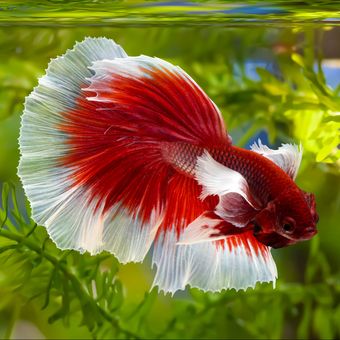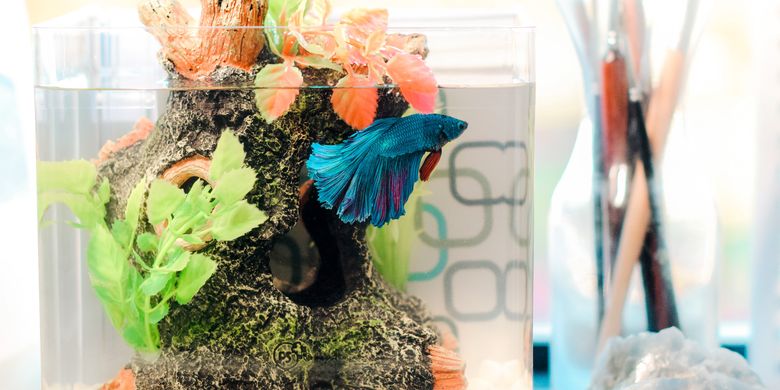JAKARTA, KOMPAS.com – Often found by the owner Betta fish maintain decorative fish in a relatively small glass vase. This condition is often seen in ornamental fish stores.
The purpose of placing your betta in a vase or container of small size is likely to ensure that the betta does not fight. This is because male betta fish can kill each other easily.
There are also rumors going around that a hickey in a vase is a good thing to do.
Also read: Here’s how to deal with betta fish that have difficulty defecating
However, whether raising betta fish in the vase is the right thing? Reporting from Betta Care Fish Guide, Tuesday (6/4/2021), along with the explanation.
The answer is no. Some have tried to defend the idea of keeping bettas in vases by claiming that bettas “in the wild” will often live in small, shallow waters. This is true.
However, there is a world of difference between rich wild ecosystems and home vases. It is impossible to completely imitate the natural habits of a Betta fish at home.
Why aren’t vases good for betta fish?
There are several reasons why vases are not suitable for betta fish. Here are among them.
Also read: How long is the life of a Betta Fish? Here’s the explanation
1. The size is not big enough
Betta fish is known to live in some fairly small locations. However, wherever a Betta fish lives, including in the wild, it will be much larger than an ordinary vase.
If you put a hornbill in a medium -sized vase, it will not swim well. There will be no water to explore.
This will be very sad conditions for your Betta fish. Imagine if you were confined in a tiny and tiny room for the rest of your life, how would it feel?
2. Without filtration
Fish produce a lot of waste, and water will be a breeding ground for bacteria. If the water in which your Betta fish lives is not properly filtered, then the Betta fish will basically be swimming in its own excrement.
Betta fish will inhale all kinds of poison and this will cause premature death. Not only that, lack of filtration will reduce the amount of oxygen in the water and your Betta will start suffocating.
There are many people who claim that regular cleaning can help with this problem, but they don’t.
If you have a small vase with betta fish, you can clean the vase every day, but the water will always be dirty, and this will always be bad for your betta.
3. No heating
Betta fish come from warm climates. This means they need relatively warm water to live.
Also read: How to deal with flatulence in betta fish
The body of a Betta fish has basically been created for that. If the water they are swimming in has not warmed to the required temperature, the Betta fish will become very cold.
This will lead to the premature death of the Betta fish. Not. Betta fish raised in captivity will not “evolve” to deal with the colder water in the vase.
They may have been bred in captivity, but still need a certain warmth to the water.
4. Insufficient surface area
The breathable Betta fish is a little different from other fish. This is because of the way they live in the wild.
Also read: Tips for Creating an Environment for Betta Fish to Live Long
In normal cases, fish can get oxygen from water. Although Betta fish do this too, there is generally not enough oxygen in the water they normally use for swimming in the wild.
This is because the water tends to be shallower and denser. So betta fish will regularly return to the surface to get large amounts of oxygen into their system.
The problem with vases is that there will likely not be enough water flowing to the top of the vases for them to breathe when they return to the surface. Again, this will most likely cause your Betta to suffocate.
5. Betta fish are carnivores
There are some people who seem to believe that Betta fish eat plants. In fact, Betta fish are carnivores.
 Illustration of a betta fish in an aquarium. –
Illustration of a betta fish in an aquarium. –
If your Betta eat mostly plants, this will cause problems. Some people put betta fish in a vase and expect them to eat the plants.
Betta fish need animal protein to enter their system, which can cause more problems. Betta fish usually eat from the surface of the water.
They like to eat flies and any insects that are above the water. This can be difficult when your betta is swimming in the vase.
Also read: 7 Things That Can Cause Bloated Betta Fish Stomach
You can drop live feeders, such as worms, into the vase, but this will overcrowd the vase. Animal protein also breaks down differently in water, which in turn contributes to the bacterial problem.
This is probably not the main reason why you should avoid keeping a hickey in a vase. However, you should really be aware that Betta fish eat a different diet from most aquarium fish in general.
Keeping your betta fish in a vase will make it difficult for you to provide them with the food they need.
– .


